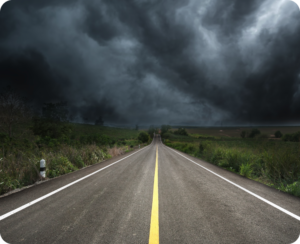If you have been following the news and the articles we have posted on our blog, you may already know that the climate is changing and how this change is causing more and more damage brought on by unprecedented climate tragedies.
Last year, the derecho storm that moved from Iowa to Indiana caused an estimated $7.5 billion in damage, considered the largest storm damage in history. The cost of wind damage rose 63 percent in 2020 – the highest in six years. And nearly 40% of all insurance claims were for weather-related damage.
(New report data from LexisNexis Risk Solutions)
How does this affect my insurance?
An insurance policy is almost a gamble. Essentially, you are betting that something might happen to your house throughout the year while the insurance company bets that nothing will happen, as it has committed to covering the damages in case it actually does.
This insurance company’s bet is not just out of the blue, it is based on data, risk models, weather forecasts, risk zones, probabilities, loss costs and a bunch of other numbers.
Your bet should also be based on data. Get to know the region you will live in and educate yourself on the history of weather events and the risks of future events. This information not only affects your rate value, but can also affect your chances of needing home insurance.
Can I go without home insurance?
What is happening is that the weather has become increasingly unpredictable, and we are seeing an increase in climatic events, as well as the damage caused by them.
Unpredictability leads to uncertainties, uncertainties lead to higher rates and more restricted coverage. In some regions, with clearer visible risks and vulnerability, people are already paying more for less coverage.
The more unpredictable the weather becomes, the harder it is to ensure the security and integrity of your home. And when these events take place, you, along with many others, are affected at the same time which leads to high losses with the potential to lead an insurer bankrupt.
The ideal is to assess climate risks and simulate your insurance before moving to a new home.
How can I increase my chances or decrease my rates?
If there is one type of customer that insurers like, it’s an emergency-ready customer. Equipping your home with security systems can be a good way to show insurers that you also do not want anything to happen.
Equipment that may be in your favor when quoting insurance:
- Burglary system: alarms, smart locks, camera circuit. Know the history of your neighborhood and make security compatible with the area.
- Flood system: construction made with the passage of water in mind, sensors, door and window seals up to date.
- Fire system: sprinklers, smoke detectors, new fire extinguishers.
It is essential to know the risks in the region and prepare for what may come, so you can lower your insurance rates and, above all, protect your family and property.
What do you do in an emergency?
So you did everything you could to avoid it, but still, your house is hit. What do you do? The main thing is to remain calm so that you can assess the damage and plan the next steps with a clear mind.
- Confirm that everyone present is safe and secure.
- Check the conditions of the affected area and whether it is safe to travel there.
- Write down notes and take pictures; make records of everything you consider relevant.
- Contact the insurer to file the claim. If it’s a climate tragedy with many places hit, be patient, other people are doing the same thing as you.
- Check your policy to identify and confirm your coverage. Remember that the policy has guidelines on how to file claims.
Tip: have a copy of your policy in a digital version so that the document is always accessible for consultation. If you are a Breezy Seguros customer and do not have your digital version, just get in touch with us and we will provide it for you.
Stay Informed
Massive climatic phenomena are becoming more and more frequent and our physical capacities in the face of the forces of nature are limited. However, our best defense continues to be information. Information helps us plan, prepare and take the right actions to keep ourselves safe.
We have several articles that can help you prepare:
What do you do before, during, and after a flood?








